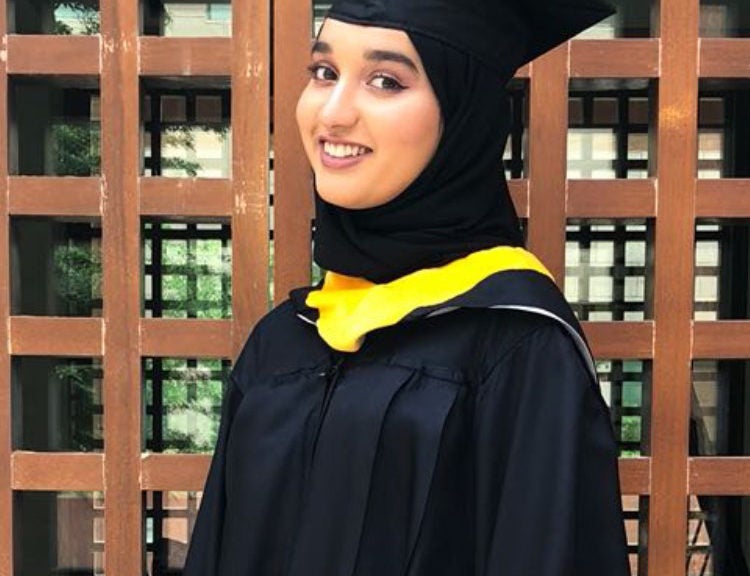Georgetown Seniors Reflect on Four Years of Learning, Inside and Outside the Classroom

For Georgetown University in Qatar’s (GU-Q) Class of 2018, the future starts next week. With their last classes behind them, they are now preparing for the University’s traditional commencement ceremony, where they will be awarded their Bachelor of Science in Foreign Service degree.
Afif Haitsam, Kholoud Al Shiba, Emma Mogensen, and Nayab Rana are members of the tenth class to graduate from GU-Q since the university opened its doors in Doha in 2005. They will join the ranks of some 440 GU-Q alumni, who are now leading diverse careers in industries including energy, health, law, finance, media, and foreign affairs.
Haitsam recalls starting his first year at GU-Q, and being told by his father that university would change the way he thinks. “Over the past four years, my experience at Georgetown has definitely transformed the way I think,” he said. “However, this doesn’t mean that I have changed my views and beliefs. Rather, the liberal arts education at Georgetown has allowed me to think critically and reevaluate certain views and beliefs I have, and in doing so has made me more well-informed in why I hold these views and beliefs in the first place.”
During his time at GU-Q, Haitsam was involved in many facets of student life. He was vice president of the Georgetown Business Society, in addition to serving as a member of the Middle East Studies Students Association (MESSA), and helping to organize its annual research conference.
“Given that the conference is wholly student-run, the experience of hosting the conference truly put our leadership, time-management, and communication skills to the test,” he said. “As a team, we contacted universities from all around the world and facilitated all of the communication between the participants and the organizers. I am proud to say that we had the most submission MESSA has ever received to date!”
For Kholoud Al Shiba, who majored in International Economics, her time at Georgetown also presented many opportunities to learn inside and outside the classroom. Over the last two years, she has helped organize a number of events, from Palestinian cultural evenings to lectures by notable academics.
One of the clubs Al Shiba was part of is the student-to-student dialogue club, which organizes video calls with students in conflict zones, such as Gaza. “It’s one of the best experiences I’ve had at Georgetown. We talk about topics that we choose, from hobbies to resistance,” she said. “We got to talk to them about their experiences, and what they thought about our involvement. Where else would I get to have that experience to ask certain questions?”
Mogensen, who majored in International History, explained that while she has a range of interests, her time as a student taught her how to prioritize and focus on what was most important to her.
“I think my experience at Georgetown has been challenging, both in the ways I expected but also in ways I completely didn’t expect,” she said. “You go in knowing the academics are going to be difficult. But you’re going to be pushed in terms of social life, and extra-curriculars, and you’re going to be pushed to learn more about yourself and how you manage your time… I’ve learnt a lot from that.”
In addition to her studies, Mogensen worked as a research assistant at GU-Q’s Center for International and Regional Studies, where she conducted research on international migration, a field she would like to be involved with in the future. “Working there, and especially the kind of work that they do… I found it really interesting,” she said. “It’s opened up research as a possibility for me.”
Rana explained that educational enrichment programs and involvement on and off campus activities was a key part of her time at GU-Q. The International Politics major was the captain of the basketball team and served as secretary general of the Model United Nations (MUN) for the last two years.
“MUN is one of the ways I feel you can get this information to the younger population. You don’t have to major in international politics, but you should know what’s going on in the world,” she said. “Regardless of what occupation you go into… As a citizen of the world, that’s your responsibility.”
Rana also participated in GU-Q’s Zones of Conflict, Zones of Peace program, which takes students to zones of ethnic, political, social, and religious conflict. This year, students visited Tokyo, Hiroshima, and Nagasaki to study the aftermath of the atomic bombing and better understand the process of reconciliation.
“It was this moment to see that what we learn about in classes actually applies to the real world,” Rana explained. “Standing there, on ground zero where the bomb was dropped… I’d been studying this for a year and a half, I’d been talking about it since elementary school. Talking to people there who were part of the actual event was one of the most mind-blowing things. It was surreal.”
The students graduate next week with the same internationally recognized degree as those on Georgetown’s Main Campus in Washington, D.C. The unique, interdisciplinary program prepares them to tackle the most important and pressing global issues by helping them develop critical thinking, analytic, and communication skills within an international context.